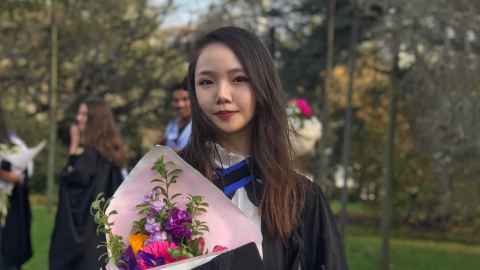Runzhe Gao
After graduating with a double major in statistics, pharmacology, and toxicology, Runzhe Gao went on to complete a masters degree in statistics. She now works as a biostatistician in Auckland.

"I decided to pursue higher education in statistics because it is a skillset applicable in all aspects of daily life – from how your groceries are priced at the supermarket to predicting the spread of Covid-19. I thought it would open many career pathways for me, and it certainly has, as I'm now working in a field heavily reliant on the skills I learned in my degree.
"I also like dealing with facts, figures, and numbers, so statistics was a natural choice. Through the Master of Statistics program, I built skills to complement my existing Pharmacology knowledge. I gained hands-on experience working with real-world datasets and applying statistical methods to answer research questions in the health industry.
"Overall, my interest in this study area stems from a desire to use my analytical skills to impact the world positively. I believe that statistical methods can play a crucial role in advancing healthcare and improving patient outcomes, and I am excited to be part of that effort.
"The University of Auckland is the home of R (programming language), and is known for its statistics department. I was very satisfied with the level of education and support the University of Auckland provided throughout my bachelor's degree. Thus, I decided to complete my postgraduate education here.
"I like how the content of the programme is constantly evolving. The statistics department maintains close connections with the industry. The course content is optimised to teach the most in-demand and cutting-edge skills and demonstrate how they apply to real-world projects and datasets. This gave me confidence when facing real projects in the workplace.
Overall, my interest in this study area stems from a desire to use my analytical skills to impact the world positively. I believe that statistical methods can play a crucial role in advancing healthcare and improving patient outcomes, and I am excited to be part of that effort.
"My advice to anyone considering this area of study is there are always more opportunities out there than you think. The application of this subject is so broad. Think outside the box and talk to different people; the University is a great place to learn about various industries you may have never considered before.
"Explore all your dissertation options and push yourself to choose the most challenging one; you will learn a ton from the project and come out with invaluable skills to take with you into the future.
"University will never prepare you for everything you will encounter in your career, but it prepares you for as much as possible during your short tenure here.
"Anytime I felt unsure about something, whether it be my coursework, direction of research, or career projection, I could always head to the Statistics department and chat with any of the friendly lecturers, supervisors, or postgraduate advisers who would give their time to really understand my concerns and offer honest feedback for me to make good decisions going forwards.
"I participated in a fortnightly bio stats research meeting, which provided insight and developed my understanding of the industry I wished to enter after graduating. The professional knowledge gained from this research group and the soft skills developed by Career Development and Employability Services (CDES) employability panels and CV checking gave me a good starting point when seeking employment as a graduate."
We're always looking for stories to share from our passionate Science students.
If you have a story, we'd love to hear from you. Email science-web@auckland.ac.nz.